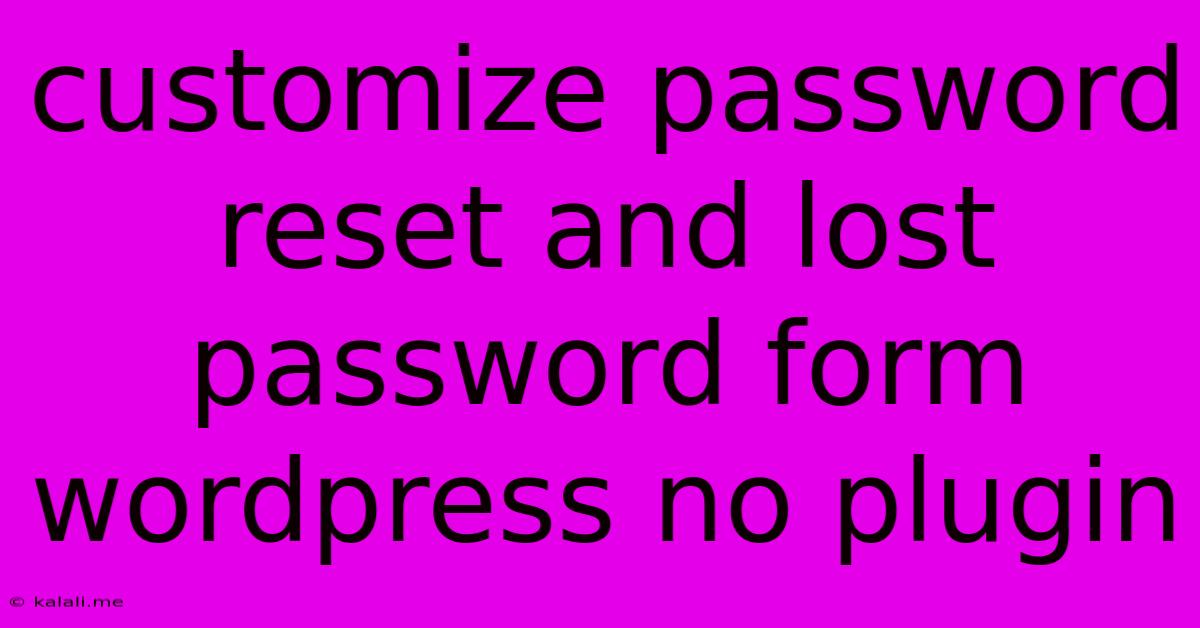Customize Password Reset And Lost Password Form Wordpress No Plugin
Kalali
May 23, 2025 · 3 min read

Table of Contents
Customize WordPress Password Reset and Lost Password Form Without Plugins
Are you tired of the generic WordPress password reset form? Want to enhance the user experience and improve your site's security without relying on plugins? This guide shows you how to customize your WordPress password reset and lost password form entirely using core WordPress functionality and custom code. This approach offers improved speed and security by avoiding third-party dependencies.
This tutorial will cover:
- Understanding the WordPress password reset process.
- Customizing the lost password email.
- Modifying the password reset form's appearance and functionality.
- Adding custom fields for enhanced security.
Understanding the WordPress Password Reset Process
Before diving into customization, let's understand how the default WordPress password reset works. When a user requests a password reset, WordPress sends an email containing a link to a reset page. This link contains a unique token, allowing the user to set a new password. This process relies on WordPress's built-in functions and the wp_lostpassword_url() function, which can be customized.
Customizing the Lost Password Email
The default password reset email is functional but lacks personalization. We can improve this by modifying the email's content and appearance. This requires creating a custom function using add_filter('retrieve_password_message', 'my_custom_password_reset_email'). Here's an example:
function my_custom_password_reset_email( $message, $key, $user_login, $user_data ) {
$message = "Hi {$user_login},\n\nYou're receiving this email because you requested a password reset for your account on our website.\n\nClick the following link to reset your password:\n\n" . network_site_url("wp-login.php?action=rp&key={$key}&login={$user_login}") . "\n\nIf you didn't request this, please ignore this email.\n\nThanks,\nThe {$user_data->display_name} Team";
return $message;
}
add_filter( 'retrieve_password_message', 'my_custom_password_reset_email', 10, 4 );
This code replaces the default email with a more user-friendly and branded version. Remember to replace {$user_data->display_name} with your site's name or a relevant branding element.
Modifying the Password Reset Form's Appearance and Functionality
The appearance of the password reset form can be enhanced using CSS. Add custom CSS to your theme's style.css file or a custom CSS file. You can target specific elements of the form using their class names or IDs. For example, you can modify the form's colors, fonts, and layout to match your website's design.
To add custom functionality, you might need to create a custom template for the password reset page (e.g., wp-content/themes/yourtheme/lostpassword.php). This gives you complete control over the form's structure and elements. However, ensure this custom template adheres to WordPress's coding standards and security best practices.
Adding Custom Fields for Enhanced Security
While not directly modifying the form's appearance, you can enhance security by adding custom fields. For example, you could implement a reCAPTCHA to deter automated password reset attempts or add a security question. This requires more advanced coding skills and might involve creating a custom plugin or extending the core WordPress functionality significantly. Implementing such features demands careful consideration of user experience to avoid frustrating legitimate users. Thorough testing is crucial to ensure functionality and avoid security vulnerabilities.
Important Considerations:
- Security: Always sanitize and validate user inputs to prevent security vulnerabilities like cross-site scripting (XSS) attacks.
- Testing: Thoroughly test all customizations to ensure they work correctly and don't break the password reset functionality.
- Backup: Before making any code changes, back up your website to prevent data loss.
- Child Theme: Implement customizations within a child theme to avoid losing changes when updating your parent theme.
This comprehensive guide offers a robust foundation for customizing your WordPress password reset experience. Remember to prioritize user experience and security while implementing these changes. By carefully tailoring the password reset process, you enhance the security and overall usability of your WordPress site.
Latest Posts
Latest Posts
-
How Many Cups Is 1 Pound Of Cheese
Jul 12, 2025
-
30 X 30 Is How Many Square Feet
Jul 12, 2025
-
How Much Does A Half Oz Weigh
Jul 12, 2025
-
Calories In An Omelette With 3 Eggs
Jul 12, 2025
-
How Do You Say Great Grandmother In Spanish
Jul 12, 2025
Related Post
Thank you for visiting our website which covers about Customize Password Reset And Lost Password Form Wordpress No Plugin . We hope the information provided has been useful to you. Feel free to contact us if you have any questions or need further assistance. See you next time and don't miss to bookmark.